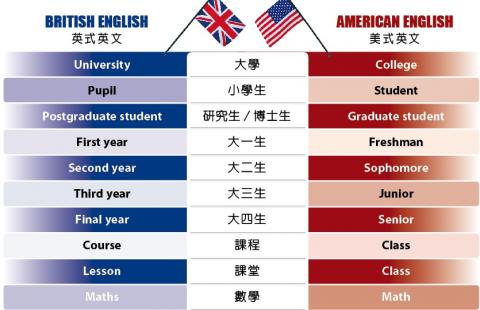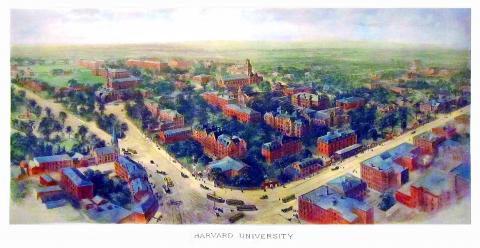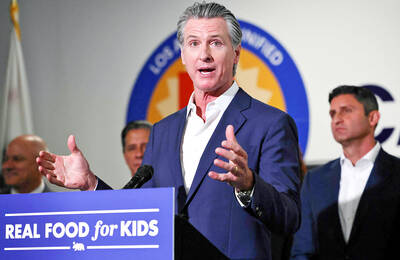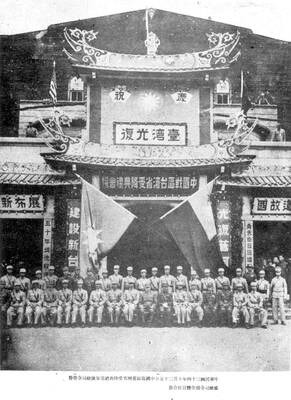There are many differences between American and British English on the subject of education. Here are some of them.
In the UK, students go to a university for an academic degree and to a college for more skills-based vocational training; in US English, college also refers to a university in which one gets their bachelor’s degree.
In the UK, a student is someone studying in a college or university, while a child in elementary — or primary — school is called a pupil. In the US, a student is anyone studying, from elementary school up through university. Someone in the US who has completed their bachelor’s degree and is pursuing a further degree is called a graduate student; in British English, the term is postgraduate student. The system used in the US to refer to the four years as an undergraduate — freshman, sophomore, junior and senior — is not used in the UK, where they simply say first/second/third and final year student.

In both countries, the word “class” refers to the unit of people you are studying with (as in, “I was in the same class as your brother in senior high school”). In the US, a class is also a course of instruction in a given subject (as in, “I’m taking a class in math”) but in the UK this would be called a course (“I’m taking a course in maths”). The idea of class collectively referring to every student graduating in a certain year (“I was in the class of 1997”) does not exist in the UK.
Finally, in the US, class is the specific period during which you are taught (“What time is your math class today?”) but in the UK they would use lesson for this (“What time is your maths lesson?”).
(Paul Cooper, Taipei Times)

Photo: Wikimedia Commons
照片:維基共享資源
美式英文和英式英文的教育用語有許多差異,此處介紹幾個例子。
在英國,學生到「university」(大學)去攻讀學位,而到「college」(學院)去接受比較屬於技能方面的職業訓練。在美式英文中,「college」也指可修讀學士學位的大學。
在英國,「student」(學生)是指在「university」或「college」就讀的人,而上小學──「elementary school」(或「primary school」)的孩子則稱為「pupil」(小學生)。在美國,從小學到大學的學生都可稱為「student」。已獲學士學位並繼續深造的學生,在美國稱為「graduate student」(研究生∕博士生),而英式英文則是說「postgraduate student」。美國稱呼大一生至大四生的用語分別是「freshman」、「sophomore」、「junior」、「senior」,但英國並未採用這套用語,而只是稱為「first year student」、「second year student」、「third year student」,以及「final year student」。
在英、美兩國,「class」都是指「班級」──例如,「I was in the same class as your brother in senior high school.」(我高中和你哥哥同班)。在美國,「class」也是一門課的教學課程──例如,「I’m taking a class in math」(我修數學課),但在英國則是用「course」這個字──例如,「I’m taking a course in maths」。美國的「class」也有「屆」的意思──例如,「I was in the class of 1997」(我是一九九七級/一九九七年畢業的一屆),但在英國並沒有這樣的用法。
最後,「class」在美國也指上課的特定時段──例如「What time is your math class today?」(你今天幾點上數學課?),但在英國則是用「lesson」這個字──「What time is your maths lesson?」。
(台北時報林俐凱譯)

California will phase out certain ultra-processed foods from school meals over the next decade under a first-in-the-nation law signed on Oct. 8 by Gov. Gavin Newsom. The law seeks to define ultra-processed foods, the often super-tasty products typically full of sugar, salt and unhealthy fats. The legislation requires the state’s Department of Public Health to adopt rules by mid-2028 defining “ultra-processed foods of concern” and “restricted school foods.” Schools have to start phasing out those foods by July 2029, and districts will be barred from selling them for breakfast or lunch by July 2035. Vendors will be banned from providing the “foods

In today’s fast-paced world, many individuals are turning to alternative lifestyles that prioritize sustainability and simplicity. Two such lifestyles are sustainable living and minimalism. They both share some common threads: living more intentionally, reducing our environmental impact, and focusing on what truly matters. 1. Sustainable Living Sustainable living is about making choices that are environmentally friendly in every aspect of one’s life. The primary goal is to minimize one’s ecological footprint, conserve natural resources, and reduce waste. It might sound abstract, but in fact, it is rather easy to practice sustainable living. What we eat has a great impact on the environment. Small

Have you ever bought a new smartphone and suddenly found yourself dissatisfied with your perfectly fine headphones? Before long, you’ve purchased premium wireless earbuds, a protective case and a fast-charging station. What begins as a single acquisition snowballs into a shopping spree—this is the Diderot effect in action. Named after the 18th-century French philosopher Denis Diderot, the Diderot effect originates from an essay he wrote. In it, he recounted receiving a luxurious robe as a gift. As lovely as it was, the robe clashed with the rest of his humble belongings. One by one, he replaced his possessions to match the

對話 Dialogue 清清:華華,你知道這禮拜為什麼又有三天連假嗎? Qīngqing: Huáhua, nǐ zhīdào zhè lǐbài wèishénme yòu yǒu sān tiān liánjià ma? 華華:知道啊!10月25號是臺灣光復節,從今年起,又是可以放假的國定假日了。剛好碰到禮拜六,所以禮拜五多補一天假。 Huáhua: Zhīdào a! Shí yuè èrshíwǔ hào shì Táiwān Guāngfù Jié, cóng jīnnián qǐ, yòu shì kěyǐ fàngjià de guódìng jiàrì le. Gānghǎo pèngdào lǐbài liù, suǒyǐ lǐbài wǔ duō bǔ yì tiān jià. 清清:對了! 我想起來了,聽我爸媽說過,以前十月有好幾天都放假,光復節是其中之一。 Qīngqing: Duìle! Wǒ xiǎng qǐlái le, tīng wǒ bàmā shuōguò, yǐqián shí yuè yǒu hǎojǐ tiān dōu fàngjià, Guāngfù Jié shì qízhōng zhī yī. 華華:光復節是慶祝日本人在二次世界大戰結束後,離開臺灣的日子。 Huáhua: Guāngfù Jié shì qìngzhù Rìběn rén zài Èrcì Shìjiè Dàzhàn jiéshù hòu líkāi Táiwān de rìzi. 清清:那是一九四五年的事了。 Qīngqing: Nà shì yī jiǔ sì wǔ nián de shì le. 華華:沒錯,對臺灣來說,是很重要的歷史。 Huáhua: Méicuò, duì Táiwān